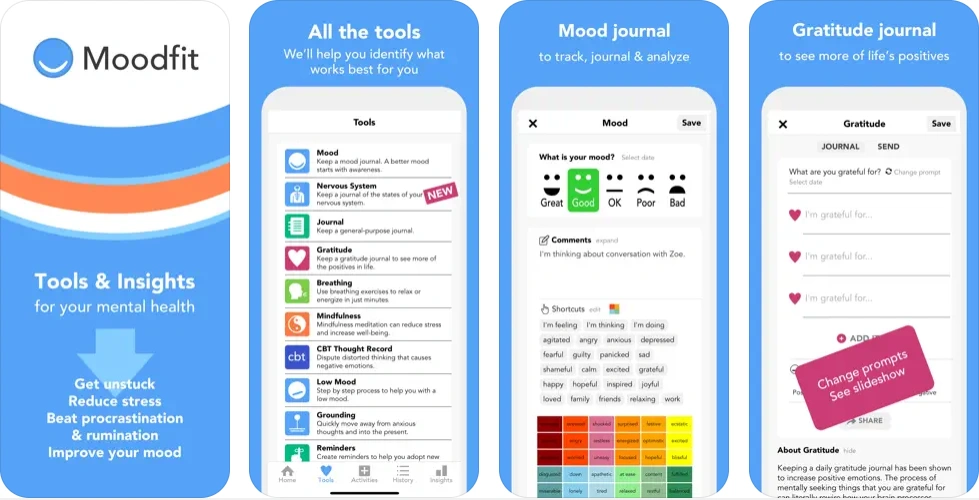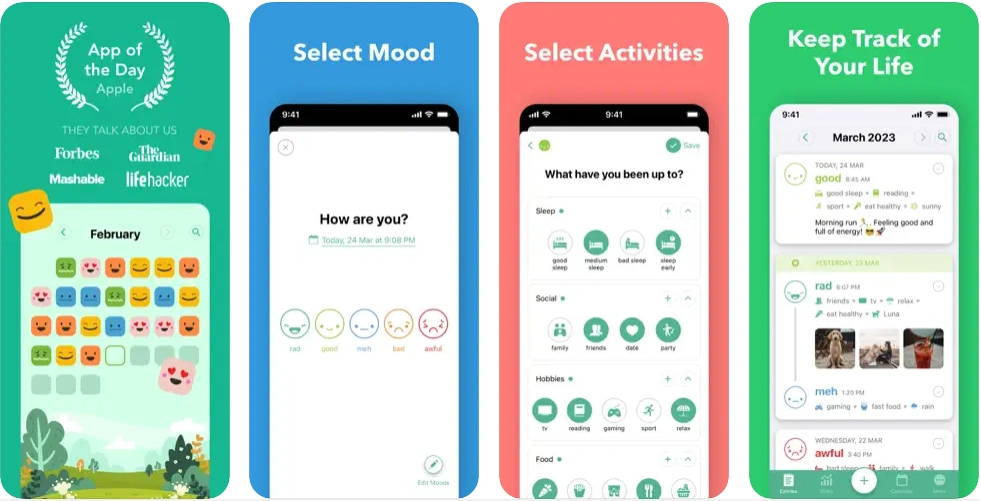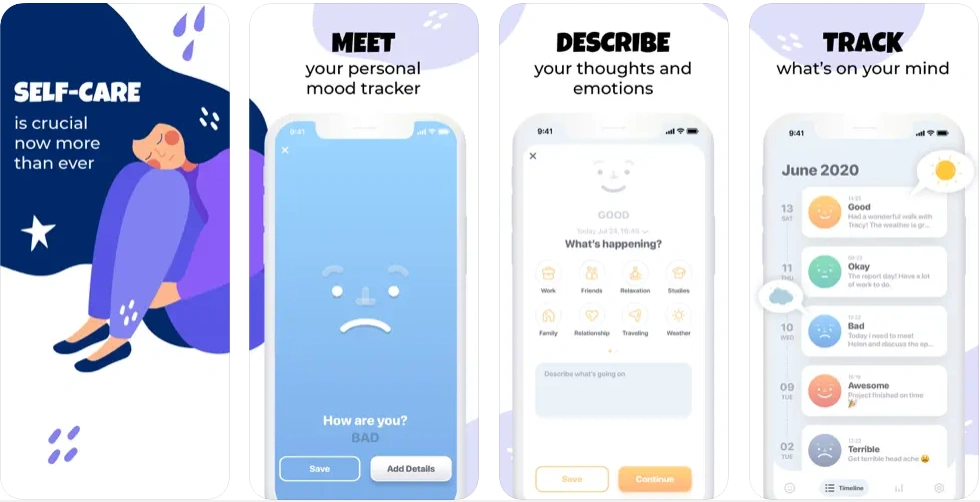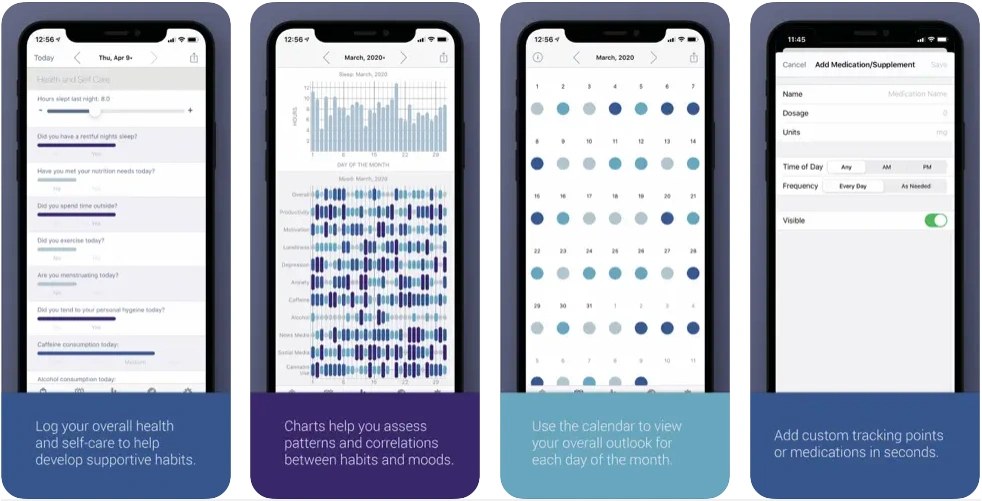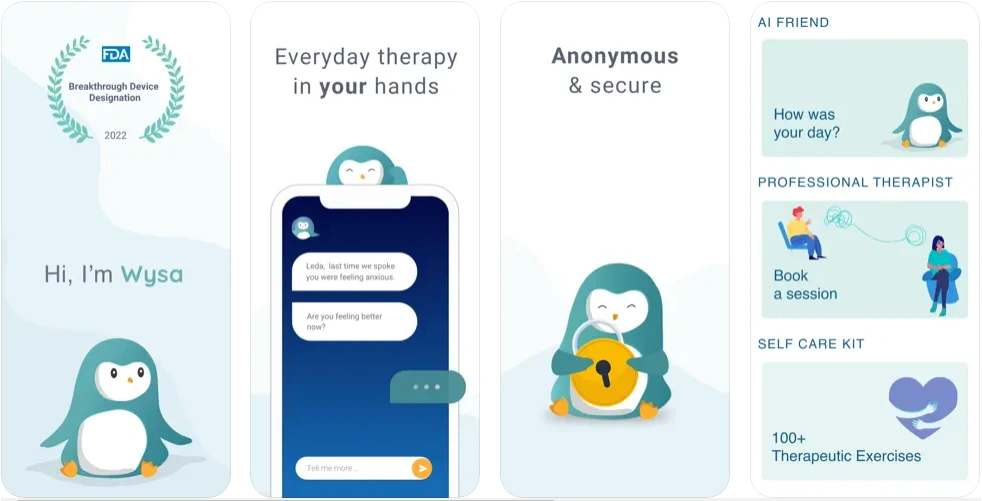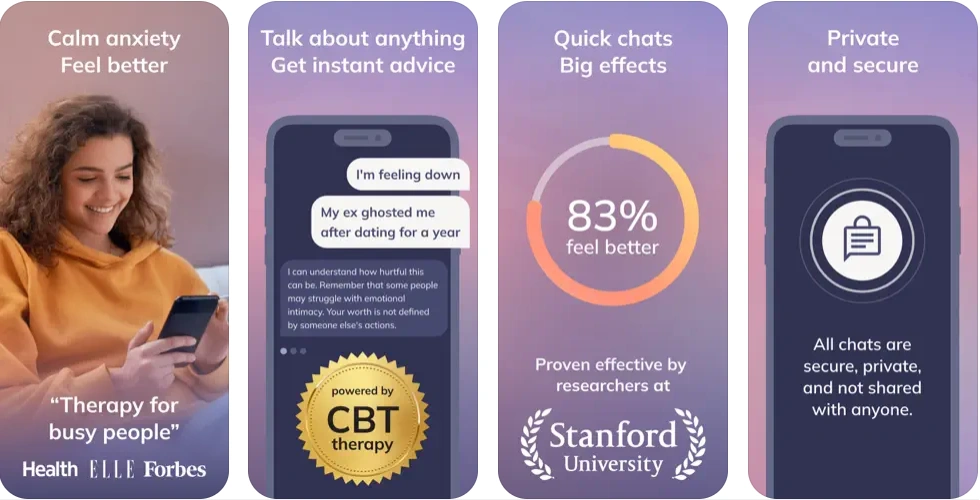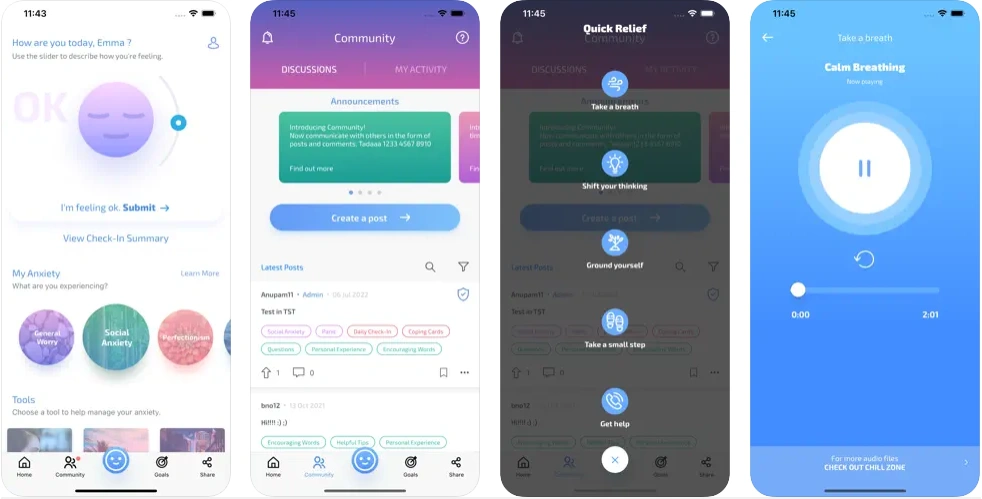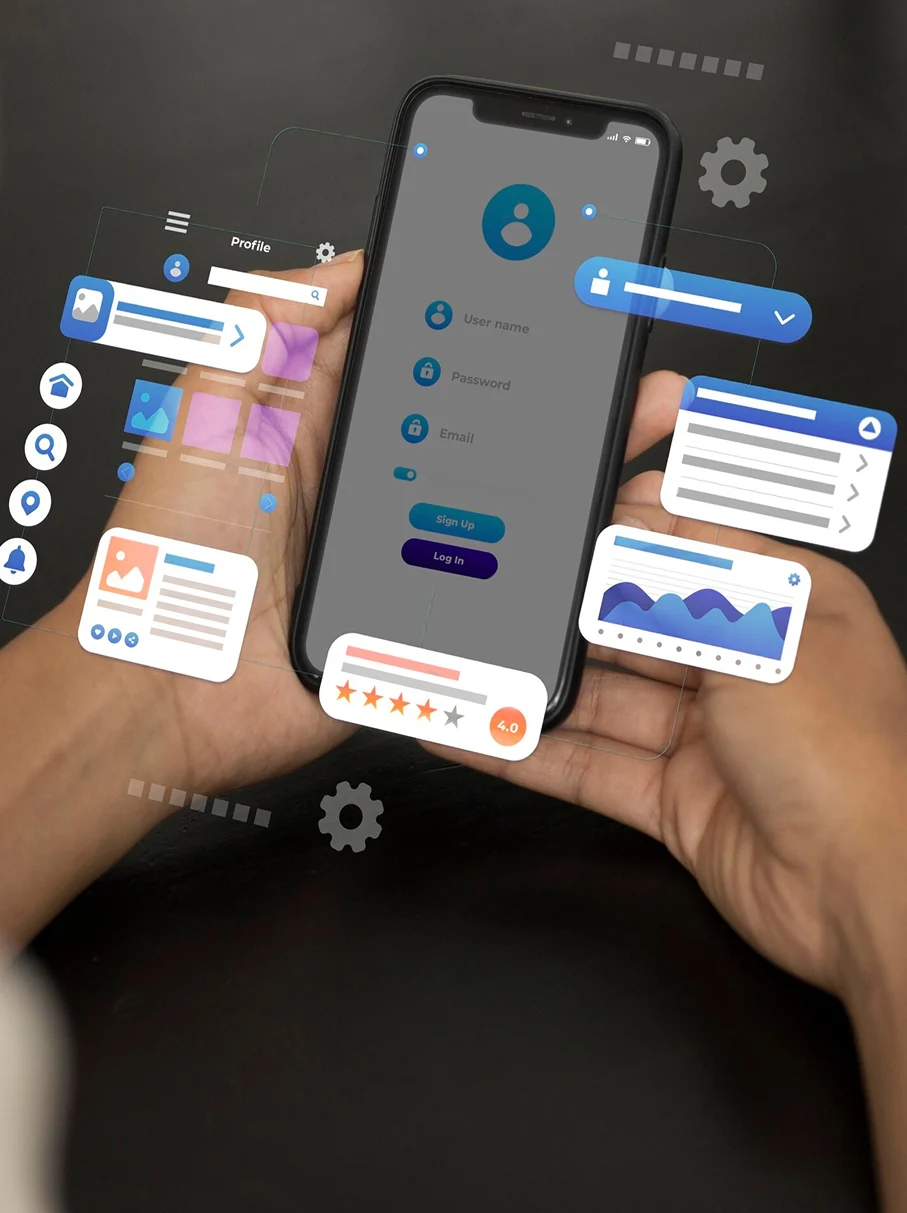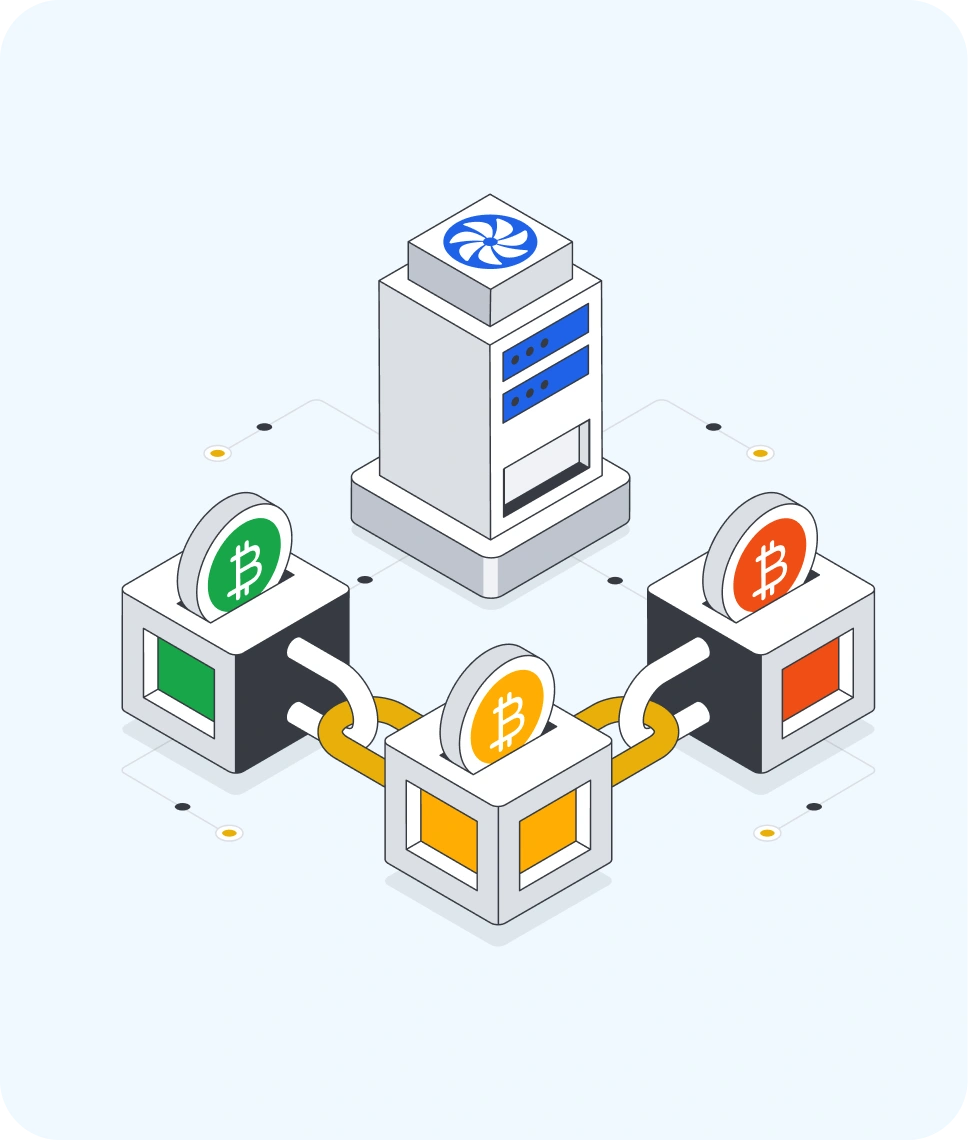Mood tracking has gained significant popularity in recent years, as people are becoming increasingly aware of the significance of mental health and overall well-being. Recognizing the impact of our emotions on our daily lives, many individuals are now seeking effective ways to monitor and manage their moods. With a plethora of options available in the market, finding the perfect mood traker app that aligns with your specific requirements can be quite overwhelming. However, taking the time to explore different features and functionalities can help you discover a tailored solution that empowers you to actively track and improve your emotional well-being. Here are some of the top mood tracker apps in 2026 that you should consider.
Top 10 Best Mood Tracker Apps In 2026
1. Moodfit: Mood Tracker App
Moodfit is a comprehensive mood tracking app that not only allows you to log your emotions but also provides insights and tips for improving your mental health. With its intuitive interface, you can easily track your moods and identify patterns over time. It also offers guided meditations, breathing exercises, and journaling prompts to help you manage stress and anxiety. Additionally, Moodfit has a community feature where you can connect with others and share your experiences.
2. Daylio: Best Mood Tracker App
Daylio is a popular mood and habit tracker app that offers a simple and user-friendly interface. It allows you to track your moods on a daily basis by selecting from customizable options such as happy, sad, or neutral. You can also add notes and activities to gain a better understanding of your emotions. Daylio also offers features like goal setting, stats tracking, and reminders to help you stay on track with your mental health goals.
3. Moodnotes: Mood Tracker App
Moodnotes is designed by psychologists and utilizes cognitive-behavioral therapy techniques to help users improve their overall well-being. It allows you to track your moods and thoughts, identify thinking patterns, and challenge negative thoughts. With its journaling feature, you can also reflect on your emotions and gain a deeper understanding of what triggers them. Moodnotes also offers personalized insights and tips based on your mood entries.
4. Pacifica: Mood Tracking App
Pacifica is an all-in-one mental health app that not only includes mood tracking but also offers features like meditation, self-care activities, and mindfulness exercises. Its mood tracker allows you to log your emotions along with any related thoughts or events. It also offers daily challenges and progress tracking to help you build healthy habits and manage your mental health more effectively. Pacifica also has a supportive community where you can connect with others for support and encouragement.
5. eMoods: Best Mood Tracker
eMoods is a mood tracker app specifically designed for individuals who have been diagnosed with bipolar disorder. It allows you to track your daily moods, symptoms, medications, and behaviors in a customizable format. You can also set reminders to take your medications or attend therapy appointments. eMoods also offers visual representations of your mood trends and patterns, providing valuable insights for you and your healthcare provider.
6. Wysa: Mood Tracker App
Wysa is an AI-based mood tracker app that uses a chatbot to provide users with emotional support and coping techniques. It offers mood tracking as well as guided conversations, self-care tools, and meditations for various mental health concerns such as anxiety, depression, stress, and sleep issues. Wysa also has a feature called “The Mood Meter” that allows you to track your mood over time and identify patterns and triggers. This app is a great tool for individuals looking for a more interactive approach to managing their mental health.
7. MoodKit: Best Mood Tracker App
MoodKit is another comprehensive mood tracking app that also offers tools for managing your overall mental health. Its mood tracker allows you to record your emotions, behaviors, and thoughts while providing insights and suggestions based on cognitive-behavioral therapy techniques. MoodKit also has a thought checker feature, which helps you challenge negative thoughts and reframe them in a more positive light. The app also offers mood-boosting activities and resources to improve your well-being.
8. Youper: Mood Tracker App
Youper is an AI-powered mood tracker and mental health coach that uses cognitive-behavioral therapy techniques to help you manage your moods and emotions. Its chatbot interface offers a personalized and conversational approach to tracking your mood and identifying patterns. Youper also provides daily check-ins, mindfulness exercises, and mood-boosting activities, making it a well-rounded tool for mental health management.
9. Sanvello: Mood Tracker
Sanvello, formerly known as Pacifica, is an all-in-one mental wellness platform that includes features such as mood tracking, guided meditations, journaling, and community support. Its mood tracker allows you to rate your emotions, record thoughts and behaviors, and identify patterns over time. Sanvello also offers a wide range of self-care tools and resources for managing stress, anxiety, depression, and other mental health concerns.
10. MindShift: Mood Tracker App
MindShift is an app specifically designed for individuals struggling with anxiety. It offers a variety of tools and resources, including a mood tracker, relaxation techniques, mindfulness exercises, and thought challenging activities. The app also provides educational articles on anxiety and allows you to track your progress over time. MindShift was developed by Anxiety Canada in collaboration with healthcare professionals and includes evidence-based strategies for managing anxiety.
Benefits of Mood Tracker Apps
Mood tracker apps offer numerous benefits for individuals looking to improve their mental well-being. These include:
- Increased self-awareness: By consistently tracking your mood and emotions on a regular basis, you can develop a deeper understanding of yourself and gain insights into the factors that may impact your mental health. This heightened self-awareness allows you to recognize patterns and trends, enabling you to make more informed decisions and take proactive steps towards maintaining your overall well-being.
- Identification of triggers: Mood trackers provide a powerful tool for identifying specific events, situations, or circumstances that may trigger certain emotions. By recording these triggers, you can gain a clearer understanding of the factors that influence your mood and learn to navigate them more effectively. This knowledge empowers you to make informed choices and take preventative measures to mitigate the impact of these triggers on your mental health.
- Better communication with healthcare providers: Keeping a comprehensive record of your moods and behaviors through a mood tracker can significantly enhance your communication with healthcare providers. By sharing this valuable information, you provide your healthcare team with a more holistic view of your mental health, enabling them to tailor treatment plans that are better aligned with your unique needs. This collaborative approach promotes better outcomes and more effective management of your mental health.
- Encourages self-reflection: Regularly reviewing your mood tracker allows you to engage in self-reflection and gain deeper insights into your emotional well-being. By observing patterns and trends in your moods, you can identify areas for personal growth and improvement. This process of self-reflection fosters a greater sense of self-awareness and empowers you to make positive changes in your life, ultimately leading to enhanced overall well-being.
- Motivation and accountability: Tracking your mood over time provides a visual representation of your progress and accomplishments. This can serve as a powerful motivator, inspiring you to continue practicing healthy habits and making positive choices for your mental health. By holding yourself accountable through the use of a mood tracker, you can stay focused and committed to your well-being journey, ultimately leading to long-lasting positive change.
- Reduction in symptoms: By gaining a deeper understanding of your mood patterns and utilizing appropriate coping strategies, you can experience a reduction in symptoms associated with anxiety, depression, or other mental health concerns. The insights gained from your mood tracker allow you to recognize potential triggers and implement proactive measures to manage and alleviate these symptoms. This can lead to improved emotional well-being and a higher quality of life.
In summary, incorporating a mood tracker into your routine offers numerous benefits, from increased self-awareness and better communication with healthcare providers to motivation, accountability, and symptom reduction. By leveraging the power of tracking your moods, you can take proactive steps towards nurturing your mental health and enjoying a more fulfilling life.
Features of Mood Tracker Apps
- Customizable mood tracking: The best mood tracker apps allow you to customize your tracking experience based on your individual needs and preferences. This may include selecting from a variety of moods, adding notes or tags to your entries, and setting reminders for consistent tracking.
- Data analysis and visualization: A key feature of any mood tracker app is the ability to analyze and visualize your tracking data. This allows you to easily identify patterns and trends in your mood, triggers, and coping strategies.
- Integration with other health apps: Many mood tracker apps offer integration with other health and wellness apps, such as fitness trackers or meditation apps. This enables a more holistic approach to managing your mental health, as you can track how different aspects of your life impact your mood.
- Community support: Some mood tracker apps offer a community feature, allowing users to connect with others who are also tracking their moods. This can provide a sense of support and understanding, as well as the opportunity to share tips and strategies for managing moods.
- Personal insights and recommendations: As you continuously track your moods, some apps may offer personalized insights and recommendations based on your data. This can include suggestions for self-care activities, coping strategies, or even therapy options.
- Privacy and security: It is important to choose a mood tracker app that prioritizes privacy and security of user data. Look for apps with clear privacy policies and security measures in place to protect your personal information.
Comparison Between Mood Tracker App with Other Apps
While there are numerous mood tracker apps available, it is important to choose one that meets your specific needs. It may be helpful to compare features and user reviews of different apps before deciding on the best fit for you. Additionally, some mental health professionals recommend using a combination of different apps for a more comprehensive approach to managing moods.
In comparison to other health and wellness apps, mood tracker apps offer a more focused and detailed approach to tracking emotions. While fitness trackers may track physical activity levels, they do not necessarily take into account the impact of emotional well-being on overall health. Similarly, meditation apps may help with relaxation and reducing stress, but they do not provide data on mood patterns over time.
Here is a step-by-step comparison of a mood tracker app with other types of apps:
- Type of Data Collected: Mood tracker apps specifically record and analyze emotional states throughout the day. This contrasts with fitness apps, which focus on tracking physical data such as steps, heart rate, and calories burned. Meditation apps, on the other hand, typically don’t track user data but rather provide content for stress reduction and mindfulness.
- User Interaction: Mood tracker apps require more active user participation, as users need to log their emotional states regularly. Fitness apps might automatically record data through device sensors, and meditation apps mostly involve passive content consumption by users.
- Personalization: Mood tracker apps often provide personalized insights and recommendations based on patterns in mood data. Fitness apps may also offer personalized workout plans, but these are usually based on physical data only. Meditation apps typically offer a range of content to choose from, but it may not be personalized to the user’s emotional state.
- Goals and Outcomes: The primary goal of mood tracker apps is to enable users to understand their emotional patterns better and to manage their psychological health. Fitness apps aim to improve physical health and performance, while meditation apps aim to enhance mindfulness and reduce stress.
- Privacy and Security: All apps should ideally prioritize user data privacy and security. However, given the sensitive nature of the data collected by mood tracker apps, it’s especially crucial for these apps to have robust security measures and clear privacy policies in place. Users should always be able to control their data and choose how it is used.
- Potential for Growth: While fitness and meditation apps have been popular for some time, mood tracker apps are a relatively new addition to the self-care app market. As mental health awareness continues to grow, there is significant potential for growth in this space, with more users seeking out tools to track and improve their emotional well-being.
- Integration with Other Apps: To provide a more holistic approach to self-care, mood tracker apps can also integrate with other types of wellness apps, such as fitness, nutrition, and meditation. This integration allows users to have all their health data in one place and to see connections between different areas of their well-being.
What is the Cost Procedure of a Mood Tracker App?
Costs for mood tracker apps can vary depending on the features, design, and platform. Some apps may offer a free version with limited features, while others may require a one-time or recurring payment to access all features. Additionally, some apps may offer in-app purchases for additional features or premium content.
When considering the cost of a mood tracker app, it’s essential to also consider the value it brings to your mental health journey. The benefits of being able to track and understand your mood patterns, set goals, and access resources for improving your emotional well-being may outweigh the cost for many users.
- Research: Begin by conducting thorough research on various mood tracker apps available in the market. Take the time to explore and compare their features, testimonials, and overall user experience. It can be helpful to read reviews from other users to gain insights into their satisfaction with the app. Additionally, some apps may offer a free trial phase, allowing you to test out the features and functionality before committing.
- Cost Evaluation: Once you have narrowed down your choices, take a closer look at the costs associated with each app. Look for detailed information on their pricing page or within the app details. Costs can vary widely, ranging from free options to one-time purchases or recurring monthly or yearly subscriptions. Consider your budget and the value you expect to gain from the app when evaluating the cost.
- Feature Assessment: Carefully assess the features offered in each package. Free versions of mood tracker apps usually offer limited features, while paid versions often provide a more comprehensive set of tools and functions. Some apps may even offer in-app purchases for additional features or premium content. Take into account your specific needs and preferences when considering the available features.
- Value Assessment: Consider the value that each app brings to your emotional well-being journey. This evaluation can be subjective and may vary from person to person. Reflect on the benefits of using the app, such as tracking moods, setting goals, accessing resources for emotional well-being, and any additional features that align with your needs. Determine whether the benefits outweigh the cost for you personally.
- Purchase: Once you have made an informed decision, proceed with the purchase or subscription process. Most mood tracker apps provide secure payment methods, such as credit card or debit card payments, or transactions through recognized app stores like Google Play or the App Store. Ensure that you feel comfortable with the payment method and that it aligns with your preferences and security requirements.
- Continuous Evaluation: After using the app for a while, it is important to continuously assess whether it is bringing you the value you expected. Regularly reflect on your experience with the app and consider whether it is meeting your needs and helping you track and manage your moods effectively. If you find that the app is not meeting your expectations, you may consider changing or upgrading your plan within the app or exploring alternative mood tracker apps that better align with your requirements.
How can iTechnolabs Help You to Build a Mood Tracker App?
iTechnolabs is a mobile app development company that specializes in developing custom mobile applications. They have experience in creating various types of apps, including mood tracker apps. With their expertise and knowledge, they can assist you in building a high-quality, user-friendly mood tracker app.
Some ways iTechnolabs can help you with your mood tracker app are:
- Customized Solutions: iTechnolabs understands that every individual has unique needs, and so do their mood tracker requirements. They can provide customized solutions tailored to your specific preferences and needs, ensuring that the app meets all your expectations.
- User-friendly Interface: A user-friendly interface is crucial for any mobile application’s success, especially when it comes to mood tracker apps. iTechnolabs can help you design an intuitive and easy-to-use interface for your app, making it effortless for users to track their moods and navigate through the app.
- Integration with Wearables: With the rise of wearable technology, integrating your mood tracker app with wearables like smartwatches or fitness trackers can enhance its functionality and accessibility. iTechnolabs has experience in developing apps that can sync with various wearables, providing a seamless experience for users.
- Data Privacy and Security: Mood tracking involves sensitive and personal information, and it is essential to ensure the privacy and security of this data. iTechnolabs follows strict guidelines and protocols to protect user data through encryption techniques, secure storage options, and regular updates.
- Technical Support and Maintenance: iTechnolabs offers continuous technical support and maintenance services to ensure your mood tracker app runs smoothly without any glitches. They also provide regular updates, bug fixes, and new feature additions to keep your app up-to-date and relevant.
Do you want to build a mood tracker app?
The development process of a Mood Tracker app by iTechnolabs is a comprehensive and meticulous journey. It begins with a deep understanding of the client’s unique needs and preferences to tailor a customized mood tracker solution. The next stage involves designing a user-friendly interface with a strong focus on intuitiveness and ease of navigation. This is followed by the integration of the app with wearable technology such as smartwatches or fitness trackers, increasing its accessibility and functionality.
iTechnolabs places a high emphasis on data security and privacy, adhering strictly to guidelines and protocols to protect sensitive user data. This is achieved through robust encryption techniques, secure storage options, and frequent software updates. The process concludes with the provision of continuous technical support and maintenance services, ensuring the app runs smoothly and stays updated with regular bug fixes and feature additions. This holistic approach to development ensures that iTechnolabs’ mood tracker app is not just innovative and user-friendly, but also secure and reliable.
The importance of a user-friendly interface in a mood tracker app by iTechnolabs cannot be overstated. It is broken down into the following steps:
- Intuitiveness: The iTechnolabs mood tracker app is designed with an intuitive interface, making it easy for users to navigate and operate. This allows users to quickly understand the functionality and features of the app, reducing the learning curve and leading to improved user experience.
- Ease of Navigation: User-friendly design includes streamlined navigation. iTechnolabs takes care to ensure that users can easily find what they’re looking for in the app, minimizing frustration and increasing user satisfaction.
- Visual Appeal: The user interface is not just about usability, but also aesthetics. iTechnolabs incorporates visually pleasing design elements that make the app more engaging, leading to higher user retention rates.
- Consistency: Consistency in design helps users quickly familiarize themselves with the app. iTechnolabs maintains consistency across different sections of the app, creating a harmonious and cohesive user experience.
- Feedback Mechanism: A user-friendly interface also includes a system for users to provide feedback. iTechnolabs has a built-in feature for users to communicate any issues or suggestions, demonstrating their commitment to continuous improvement.
Conclusion: Best Mood Tracker App
In conclusion, iTechnolabs’ focus on a user-friendly interface is a vital aspect of their mood tracker app development process, contributing significantly to the app’s success. With their attention to detail and commitment to creating the best user experience, it is no surprise that iTechnolabs’ mood tracker app is a top choice for users in 2025.
FAQ’s About Mood Tracker
What is the best mood tracker?
Best Mood Tracker apps for daily mood tracking are Moodfit, Daylio, eMoods, and Many more.
Is there a free mood tracker?
Some of the free mood tracker applications to download via App Store or Google Play include Daylio, Moodtracker, and Moodnotes.
Do mood tracking apps work?
Studies have shown that users who often update their moods through such applications exhibit more effective improvements in their self-resilience as well as better coping capacities in situations that require them to exercise greater stress tolerance.
How do I track my mood?
Mood tracking can be done by using mood tracking apps like Moodfit, Daylio, eMoods, Moodtracker, and Moodnotes.


